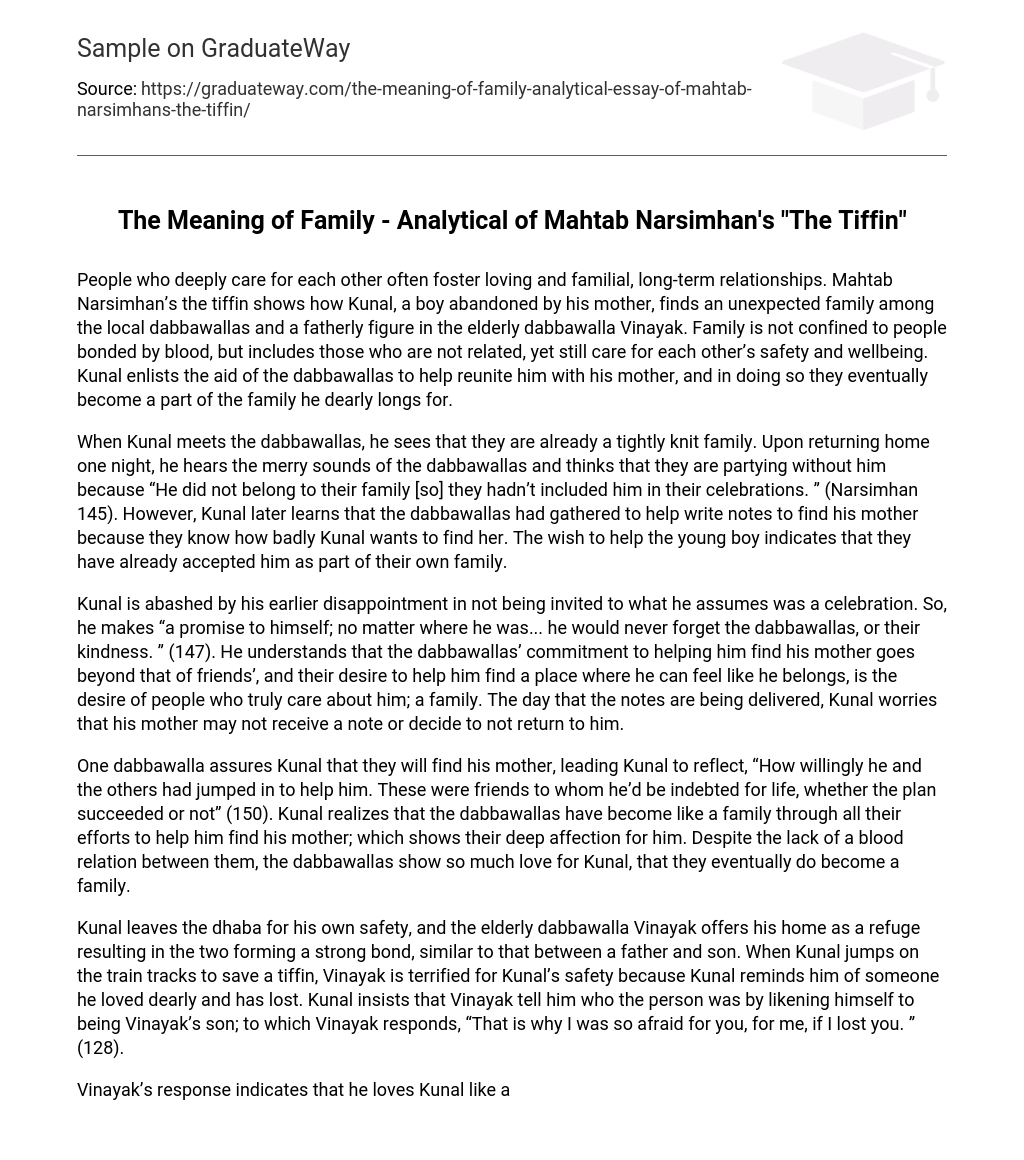The tiffin, written by Mahtab Narsimhan, illustrates the creation of loving and long-lasting relationships among people who genuinely care for one another. Kunal, a boy abandoned by his mother, discovers an unexpected sense of family within the local dabbawallas and finds a nurturing father figure in the elderly dabbawalla named Vinayak. Family extends beyond biological bonds and encompasses individuals who show concern for each other’s safety and well-being. Kunal seeks the assistance of the dabbawallas to reunite with his mother and through this journey, they soon become an integral part of the family he deeply yearns for.
When Kunal encounters the dabbawallas, he observes their strong bond as a close-knit family. On a particular evening, upon his return home, he overhears the joyful noises of the dabbawallas and assumes that they are celebrating without him as he does not belong to their family. As stated by Narsimhan (145), they had excluded him from their festivities. However, Kunal later discovers that the dabbawallas had assembled with the intention to assist him in writing notes to locate his mother, understanding his deep desire to find her. This desire to help the young boy demonstrates that they have already embraced him as one of their own family members.
Kunal is ashamed of his previous disappointment in not being invited to what he assumes was a celebration. Therefore, he makes a vow to himself that regardless of his location, he will always remember the dabbawallas and their kindness (147). He comprehends that the dabbawallas’ dedication to assisting him in finding his mother transcends that of friends. Their yearning to help him discover a place where he can feel a sense of belonging is indicative of people who genuinely care for him, like a family. On the day when the notes are being delivered, Kunal worries that his mother might not receive a note or may choose not to return to him.
One dabbawalla promises Kunal that they will locate his mother, causing Kunal to ponder, “How readily he and the others had come forward to assist him. These were companions whom he would remain grateful to forever, regardless of whether the plan succeeded or not” (150). Kunal realizes that the dabbawallas have transformed into a family due to their relentless efforts in aiding him in his search for his mother; demonstrating their profound affection towards him. Regardless of the absence of a biological bond between them, the dabbawallas exhibit such immense love for Kunal that eventually transforms them into a family.
Kunal decides to leave the dhaba for his safety. Fortunately, an elderly dabbawalla named Vinayak offers him shelter in his home, creating a strong bond between them similar to that of a father and son. However, when Kunal risks his life by jumping on the train tracks to save a tiffin, it terrifies Vinayak. This courageous act reminds Vinayak of someone dear whom he lost. Intrigued, Kunal insists on learning about this person and points out the similarities between himself and Vinayak’s own son. In response, Vinayak expresses his fear of losing Kunal because of their intense emotional connection (128).
Vinayak has a deep love for Kunal, treating him as his own son and worrying about his well-being. When Vinayak experiences a heart attack and the hospital restricts visitation to only family members, Kunal’s devotion is put to the test. However, regardless of their lack of blood relation, Kunal boldly asserts, “I am his son, his sole family.” This demonstrates the strong connection between them and how Kunal views Vinayak as a paternal figure.
When Kunal finally meets his mother, she shows no remorse for not attempting to contact him and acts as though she is a stranger before disregarding her son. Unaware of this encounter, fellow dabbawalla Nikhil asks Kunal if he still intends to search for his mother the following day, despite Vinayak being hospitalized now. In response, Kunal states “No… I already have a family” (183). This statement refers to how Kunal considers Vinayak, a long-time acquaintance, as a dependable father figure. Together, these two individuals, who have both lost their own families, form a strong familial bond.
Despite not being related to any of the dabbawallas or Vinayak, Kunal discovers a sense of belonging and kinship among them. Vinayak assumes a paternal role in his life, while the dabbawallas become a supportive family that always looks after Kunal, unlike his biological mother. Kunal realizes that the concept of family extends beyond shared DNA or blood relations; it encompasses connections that have developed between strangers and form bonds that may be equal to, if not stronger than, those found in a biological family.





